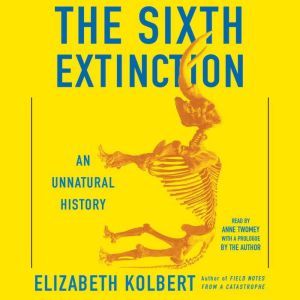

The Sixth Extinction
Author: Elizabeth Kolbert
Narrator: Anne Twomey
Unabridged: 9 hr 59 min
Format: Digital Audiobook Download
Publisher: Simon & Schuster Audio
Published: 02/11/2014
Synopsis
From the author of Field Notes from a Catastrophe, a powerful and important work about the future of the world, blending intellectual and natural history and field reporting into a compelling account of the mass extinction unfolding before our eyes.
Over the last half a billion years, there have been five mass extinctions, when the diversity of life on earth suddenly and dramatically contracted. Scientists around the world are currently monitoring the sixth extinction, predicted to be the most devastating extinction event since the asteroid impact that wiped out the dinosaurs. This time around, the cataclysm is us.
The Sixth Extinction draws on the work of scores of researchers in half a dozen disciplines–geologists who study deep ocean cores, botanists who follow the tree line as it climbs up the Andes, and marine biologists who dive off the Great Barrier Reef. Elizabeth Kolbert, two-time winner of the National Magazine Award and New Yorker writer, accompanies many of these researchers into the field, and introduces you to a dozen species–some already gone, others facing extinction–that are being affected by the sixth extinction.
Through these stories, Kolbert provides a moving account of the disappearances occurring all around us and traces the evolution of extinction as concept, from its first articulation by Georges Cuvier in revolutionary Paris up through the present day. The sixth extinction is likely to be mankind's most lasting legacy; as Kolbert observes, it compels us to rethink the fundamental question of what it means to be human.



